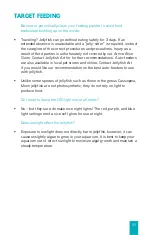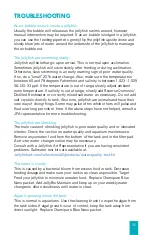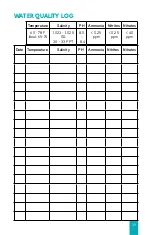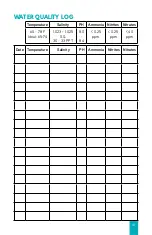
32
TARGET FEEDING
Place the recommended amount of food (1/4 scoop per feeding of 3 jellyfish)
into a small, “aquarium-use” only cup of saltwater from your aquarium.
Use your feeding pipette to mix the food to break up any clumps. This helps
ensure your food does not float on the surface of the water. Proceed to
draw in the slurry of food into the pipette and target feed this mixture to
each individual jellyfish to minimize uneaten food. Aim the pipette at the
base of the jellyfish’s oral arms and gently squirt this mixture evenly at the
undersides of the jellyfish. A cloud of food will dust the underside of the
jellyfish and stick to the oral arms to initiate feeding.
• Be sure that your cup that is used is only for aquarium feeding - as to
not introduce any cleaning chemicals from external sources. If you are
not sure of any chemical contaminants, a thorough rinse with fresh
water will work well.
• Jellyfish can be gently flipped using the feeding pipette to expose their
oral arms if you do not have a direct feeding line.
• About 30 minutes to one hour after feeding, uneaten food that may have
accumulated on the bottom of the aquarium should be re-suspended
in the water column using the feeding pipette to allow the jellyfish a
second opportunity to eat the food.
• Any food left on the bottom of the aquarium will eventually decompose
and produce Ammonia alongside other undesired chemicals that are
harmful to jellyfish well-being. If you do not notice your jellyfish eating
the remaining food off the bottom, it is best to remove the excess food
from the aquarium as soon as possible to ensure your Ammonia levels
do not elevate. It is likely you are overfeeding if you continually notice
excess food on the bottom of your aquarium. In this situation, reduce
feeding accordingly.
• Maintaining your aquarium and keeping it clean of excess food will
elongate the lifespan of your jellyfish. Keeping the water parameters
within the recommended ranges is important! For more information
about proper water quality parameters see page 24.


































